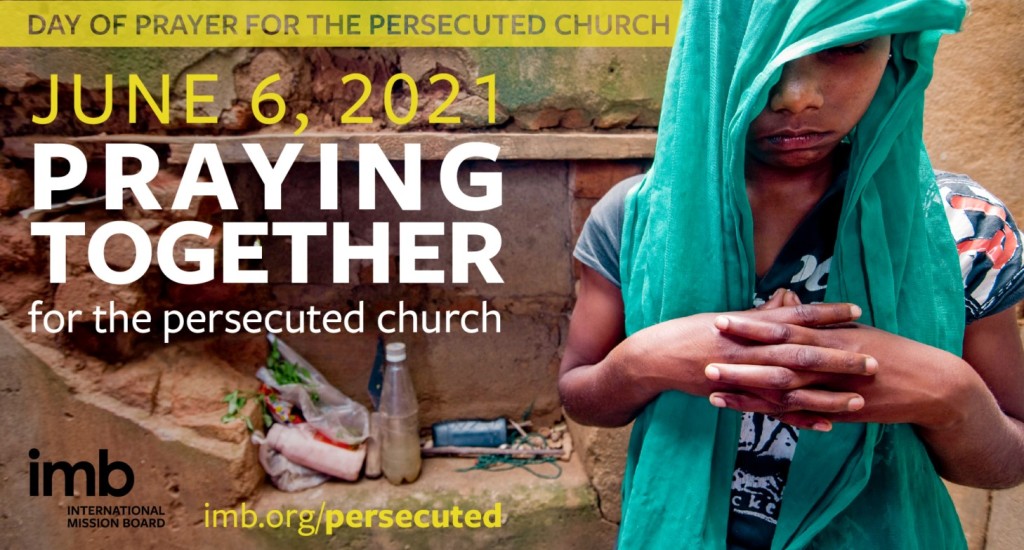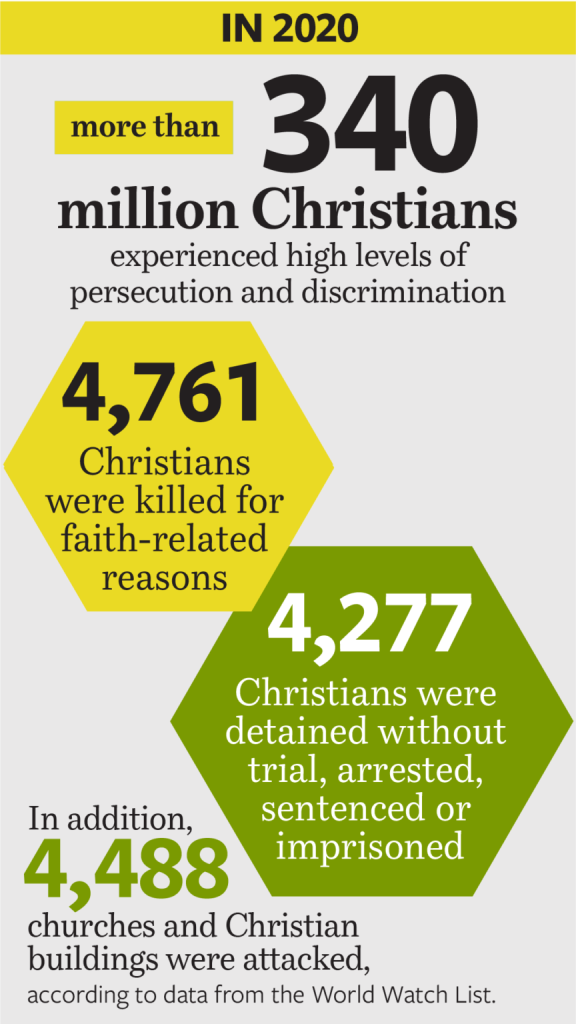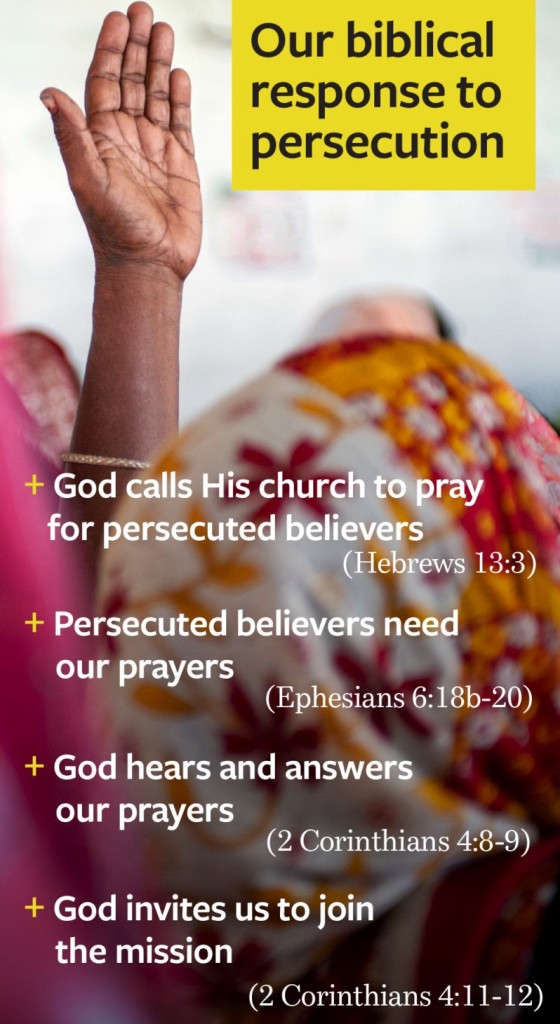Day of Prayer June 6th
Posted: June 2, 2021 Filed under: Cities, People | Tags: day of prayer, eleanor witcher, john brady, naomi, Nik Ripken, paul chitwood, persecution Leave a commentThe “International Mission Board” is collaborating with “Nik Ripken Ministries” to raise awareness about current religious persecution through the “Day of Prayer for the Persecuted Church.”
This Southern Baptist Convention wide initiative will be observed on June 6, 2021. It is a call for Southern Baptists to increase their awareness of and pray fervently for the global “persecuted” church.
In 2020, more than 340 million Christians experienced high levels of persecution and discrimination. Also last year, 4,761 Christians were killed for faith-related reasons, and 4,277 Christians were detained without trial, arrested, sentenced or imprisoned. In addition, 4,488 churches and Christian buildings were attacked, according to data from the World Watch List.
“As our Southern Baptist missionaries take the gospel to the most difficult-to-reach peoples and places around the world,” Paul Chitwood, president of the IMB, said, “they are witness to the suffering of those who boldly follow Jesus and are constantly confronted by those who persecute the Lord’s church.”
“While our hearts break for our brothers and sisters in Christ who endure persecution and even martyrdom, we often feel powerless to help them. But we aren’t! We serve the One who, as Job declared, ‘makes nations great, and he destroys them; he enlarges nations, and leads them away,’” Chitwood continued. “When we pray for those who are suffering, we have access to the One who can sustain them, comfort them and bring them justice.”
Persecution of the global church comes most fiercely from within a believer’s own family, John Brady, the IMB’s vice president for global engagement, explained. However, many believers are facing intense persecution from opposing religious groups and their governments as well.
Familial persecution is evident in the life of Naomi, a Deaf widow. COVID-19 forced her to move out of her city in Indonesia back home to a remote island. There, she converted from Islam to Christianity after working with an IMB Deaf translation team in her former city. Her parents were irate, and her dad locked her in his home and beat her daily, trying to get her to abandon her newfound faith.
Because of her daily beatings, she developed serious health complications. As she was being treated in a city six hours away, her 9-year-old daughter reached out to her mother’s church leaders for prayer. Naomi eventually recovered, and her daughter has been able to see the Lord work in her mother’s life.
However, Naomi, like so many other believers around the world, still needs prayer for her situation.
“Don’t pray for our persecution to end,” a missionary reported a national believer saying. “Pray that we will be obedient through our suffering.”
Nik Ripken, author of “The Insanity of God” and IMB missionary emeritus, explained that the main cause of persecution globally is when individuals profess Christ as Savior. Ripken has spent more than two decades studying global persecution and collecting stories from persecuted believers.
“If believers and their churches simply pray to God for persecution to end, the only way for God to answer that type of prayer is to stop people from following Jesus,” Ripken explained.
“Rather, we pray for persecuted believers to remain obedient through their suffering, and we seek to identify with persecuted believers by sharing our faith in whatever environment we find ourselves.”
Eleanor Witcher, director of the IMB’s Prayer Office, believes that one of the primary prayer needs for the persecuted church is discipleship.
“Pray that the roots of new believers, and believers who are weak in their knowledge of the Word, will quickly grow deep in Scripture as they learn to abide in Christ so that these new believers will stand firm under any persecution they may face,” Witcher said.
Witcher emphasized that this need for discipleship, growth in the Word and increased evangelism is something that all believers, not just persecuted believers, must cultivate in their own lives.
In praying for the global persecuted church, “first, we pray for ourselves that our perspective will be aligned to God’s will and then we pray for our brothers and sisters who are suffering for the glory of Christ,” Witcher said.
Southern Baptists are invited to join in prayer in the weeks leading up to the “Day of Prayer.” Specifically, believers can pray for:
- the church to pray faithfully and fervently in accordance with God’s Word and will.
- followers of Christ to consistently study and obey Scripture so they are spiritually prepared when persecution comes.
- church leaders to boldly proclaim the gospel in the face of opposition.
- the persecuted, that they have the strength to live in the power, love and sound mind that God alone can provide.
- those who are brutalized to sense the Lord’s love surrounding them and respond to those who have injured them with grace and dignity.
- the global church to commit their hearts and time in prayer and fasting for the persecuted church.
- each church to keep their focus on the glory of God and growth of His church.
Ripken believes that God’s highest purpose in persecution is to call His people to Himself, to refocus their attention to the suffering of their Lord.
“When followers of Christ suffer willingly for their Savior, it gives their faith value,” Ripken added. “That kind of suffering also increases witness.”
Join other believers across the Southern Baptist Convention by committing to pray for the persecuted church. Visit imb.org/persecuted and sign up to receive a free prayer guide.
Suffering For Christ
Posted: May 26, 2021 Filed under: People | Tags: christ, james, john, mark street, Nik Ripken, persecution, peter, prison, suffering Leave a comment“Continue to remember those in prison as if you were together with them in prison, and those who are mistreated as if you yourselves were suffering.” (Hebrews 13:3)
James, a pastor in a war-torn country, went to prison for two years. His crime: “sharing his faith.” But even imprisonment couldn’t stop him from telling the story that had changed his life.
Prison in the area where he lives looks a lot different than it does in the U.S. The government isn’t obligated to give its citizens a fair trial. No legitimate reason is even required for taking a citizen to prison; they can hold someone for as long as they want.
If no one from the outside meets the prisoner’s basic needs those needs may not get met. James was the provider for his family. As a result, his wife and children suffered on the outside while he suffered in the jail.
Even after release, James has a long road of trauma to work through. Mark Street a missionary team leader for the area, explained.
“That’s something the church needs to know. Even if he maintained his faith and came out victorious, he still had a traumatic experience. It’s really messy. He’s reunited with his family, but his kids are two years older. It’s not over. He still has to deal with two years of being in that situation.”
But, much like Apostle Paul and Silas in Acts 16, prison didn’t silence James as the government intended.
Peter, a national partner and friend of James, received a message from John, a journalist who had been jailed for six months for writing against the oppressive group in power. After watching a gospel film, he reached out to Peter.
“I saw the film, and I know that this is true. I want to believe. I want to follow Jesus. What do I do?” Peter led John to faith. When he asked how John first heard the gospel, Peter was shocked.
“Well, I was in prison for being a journalist. When I was there, I met this guy who was a Christian,” John explained. “He shared the gospel with me and told me stories. I didn’t believe then. But that was the first time I ever heard about Jesus.”
John shared that his fellow prisoner was James. Peter was reaping the harvest his friend had sown in prison.
The church in this area is small. With a population of 30 million people, less than 10,000 are known believers. But it’s growing. Much of that growth can be attributed to the humanitarian crisis the area faces. It’s opening doors for the spread of the gospel, despite persecution.
“They are coming to faith. They are being baptized,” Mark shared. Forty years ago, the number of believers could be counted on one hand.
Persecution in the area is fierce. When someone comes to faith, they are often completely abandoned by their family. Sometimes, their families even orchestrate their death. Murders of Christian family members are often overlooked by officials. Christians have no protection from the government.
Additionally, extremist groups have informal bounties on the heads of those discovered to be Christians. “It’s a highly restrictive environment to share your faith. People who do are taking a risk. But some are,” he said. Mark added, “I think these Christians feel Scripture so much more than we do, because their scriptural cries for justice like ‘How long, O Lord,’ are for real.”
- Pray for the church to support persecuted believers wisely and safely.
- Pray for the humanitarian crisis the area faces.
- Pray for believing husbands to share their faith with their wives.
“Scripture makes the point from beginning to end: persecution is the norm for followers of the one true God. It is, quite simply, like the sun coming up in the East. Persecutors intend for persecution to punish, intimidate, and silence God’s people. But God can use persecution in other ways. His highest purpose in persecution is to call His people closer to Himself, to refocus their attention to the suffering of their Lord. When followers of Christ suffer willingly for their Savior, it gives their faith value. That kind of suffering also increases witness. The number one cause of persecution globally is when people accept Jesus as their Lord and Savior. If believers and their churches simply pray to God for persecution to end, the only way for God to answer that type of prayer is to stop people from following Jesus. Rather, we pray for persecuted believers to remain obedient through their suffering, and we seek to identify with persecuted believers by sharing our faith in whatever environment we find ourselves.”
Nik Ripken, IMB missionary emeritus
For more resources on how to pray for the persecuted church, visit imb.org/persecuted.
“Don’t pray for our persecution to end. Pray that we will be obedient through our suffering.”







